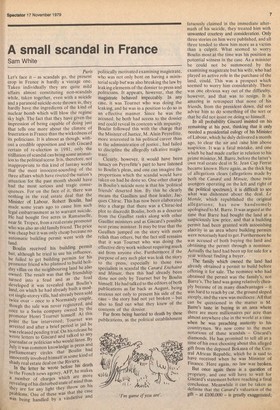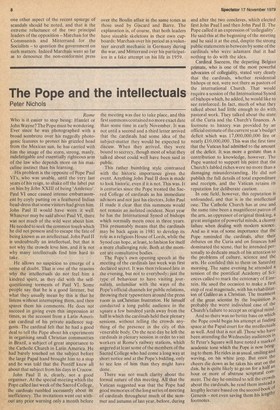A small scandal in France
Sam White
Paris Let's face it — as scandals go, the present crop in France is hardly a vintage one. Taken individually they are quite mild affairs almost constituting non-scandals while, taken together, even with a suicide and a paranoid suicide-note thrown in, they hardly have the ingredients of the kind of nuclear bomb which will blow the regime sky high. The fact that they have given the impression of being capable of doing just that tells one more about the climate of frustration in France than the wickedness of its politicians. It is almost as though, without a credible opposition and with Giscard certain of re-election in 1981, only the titillation of scandal can bring some animation to the political scene. It is, therefore, not inappropriate to this kind of fantasy world that the most innocent-sounding of the three affairs which have riveted the nation's attention for the past month should have had the most serious and tragic consequences. For on the face of it, there was nothing in the real estate deal that the Minister of Labour, Robert Boutin, had made some years ago to cause him such legal embarrassment as to warrant suicide. He had bought five acres in Ramatuelle, near St. Tropez, from a real estate promoter who was also an old family friend. The price was cheap but it was only cheap because no automatic building permit went with the land, Boulin received his building permit but, although he tried to use his influence, he failed to get building permits for his Promoter friend who planned to build holiday villas on the neighbouring land he also owned. The result was that the friendship turned into a feud and as the feud developed it was revealed that Boulm's land, on which he had already built a modest single-storey villa, had already been sold twice over — once to a Normandy couple, though the sale was never registered, and once to a Swiss company owned by the promoter Henri Tournet himself. At this Point the law intervened; Tournet was arrested and after a brief period in jail he was released pending trial. On his release he vv. rote letters to Giscard and talked to any Journalist or politician who would listen. By July it was common knowledge in press and Parliamentary circles that Boulin had innocently involved himself in some kind of Shady real estate deal on the Riviera. In the letter he wrote before his death to the French news agency, AFP, he makes a number of charges which are more revealing of his disturbed state of mind than they are for any light they throw on his problems. One of these was that the case was being handled by a vindictive and politically motivated examining magistrate, who was not only bent on having a ministerial scalp but was also breaking the law by leaking elements of the dossier to press and politicians. It appears, however, that the magistrate behaved impeccably. In any case, it was Tournet who was doing the leaking, and he was in a position to do so in an effective manner. Since he was the accused, he both had access to, the dossier and could reveal its contents with impunity. Boulin followed this with the charge that the Minister of Justice, M. Alain Peyrefitte, more interested in his political career than in the administration of justice., had failed to discipline the allegedly talkative magistrate.
Clearly, however, it would have been lunacy on Peyrefitte's part to have listened to Boulin's pleas, and one can imagine the proportions which the scandal would have taken on had he done so. One other charge in Boulin's suicide note is that his 'political friends' deserted him. By this he clearly means the Gaullists and their leader, Jacques Chirac. This has now been elaborated into a charge that there was a Chirac-led plot to discredit Boulin, both as a deserter from the Gaullist ranks along with other Gaullist ministers and as Giscard's possible next prime minister. It may be true that the Gaullists jumped on the story with more relish than others, but the fact still remains that it was Tournet who was doing the effective dirty work without requiring much aid from anyone else. Furthermore if the purpose of any such plot was leak the story to the press, especially to those two specialists in scandal the Canard Enchain and Minute, then this had already been done not only by Tournet but by Boulin himself. He had talked to the editors of both publications as far back as August, being anxious not only to present his side of the case — the story had not yet broken — but also to find out what they knew of the contents of the dossier.
Far from being harried to death by these publications, as the political establishment fatuously claimed in the immediate aftermath of his suicide, they treated him with unwanted courtesy and consideration. Only three stories on him were published, and all three tended to show him more as a victim than a culprit. What seemed to worry Boulin most at the time was his position as potential witness in the case. As a minister he could not be summoned by the examining magistrate but his wife, who had played an active role in the purchase of the land, could. This was a prospect which seemed to worry him considerably. There was one obvious way out of the difficulty, however, and that was to resign. It is amazing in retrospect that none of his friends, from the president down, did not advise him to do something of the sort or that he did not insist on doing so himself. In all probability Giscard insisted on his remaining at his post, thinking that it only needed a presidential eulogy of his Minister of Labour, which he duly delivered a month ago, to clear the air and raise him above suspicion. It was a fatal mistake, and one which he had made earlier in relation to his prime minister, M. Barre, before the latter's own real estate deal in St. Jean Cap Ferrat became known. Here again, as the thick fog of allegations clears (allegations made by both the Canard and Minute, those twin avengers operating on the left and right of the political spectrum), it is difficult to see what was dishonest about the deal. Le Monde, which republished the original allegations, has now handsomely apologised to M. Barre. It was argued at the time that Barre had bought the land at a suspiciously low price, and that a building permit had. been granted with astonishing alacrity in an area where building permits were notoriusly hard to get. Furthermore he was accused of both buying the. land and obtaining the permit through a nominee. Actually the land had been up for sale for a year without finding a buyer.
The family which owned the land had already obtained a permit to build before offering it for sale. The nominee who had obtained the permit was the family's, not Barre's. The land was going relatively cheaply because of its many disadvantages — it was hard to reach by car, the ground sloped steeply, and the view was mediocre. All that can be questioned in the matter is M. Bane's taste in buying in an area where there are more millionaires per acre than almost anywhere else in the world at a time when he was preaching austerity to his countrymen. We now come to the most notorious of these scandals — Giscard's diamonds. He has promised to tell all at a time of his own choosing about this alleged gift from the deposed Bokassa of the Central African Republic, which he is said to have received when he was Minister of Finance. Here again, no law was broken. But once again there is a question of propriety, and one will have to wait for Giscard's statement before reaching a final conclusion. Meanwhile it can be taken as definite that the Canard's valuation of the gift at £100,000 — is greatly exaggerated; one other aspect of the recent upsurge of scandals should be noted, and that is the extreme reluctance of the two principal leaders of the opposition Marchais for the Communists and Mitterrand for the Socialists to question the government on such matters. Indeed Marchais went so far as to denounce the non-conformist press over the Boulin affair in the same tones as those used by Giscard and Barre. The explanation is, of course, that both leaders have sizeable skeletons in their own cupboards: Marchais over his period as a volunteer aircraft mechanic in Germany during the war, and Mitterrand over his participation in a fake attempt on his life in 1959.







































 Previous page
Previous page